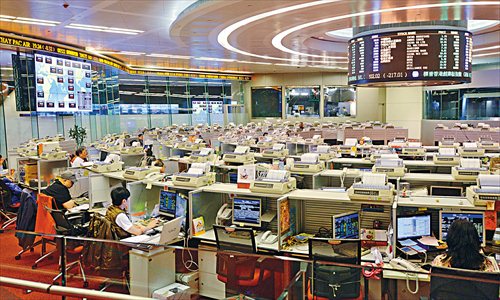HOME >> BUSINESS
China Inc waves long goodbye to Hong Kong bourse, eyes A shares
Source:Reuters Published: 2016-5-8 21:58:01

Traders work on the trading floor of the Hong Kong stock exchange on April 5. Photo: IC
As China's richest man Wang Jianlin prepares to delist his main commercial real estate company from Hong Kong, bankers expect more businesses from the Chinese mainland to do likewise in response to the deep discount for shares listed on the territory's stock exchange.Hong Kong has been the most popular location for share listings from Chinese State-owned and private enterprises for three decades, making it the world's leading destination for IPOs.
Mainland companies have long been drawn by Hong Kong's standing as a global financial hub, stable legal regime and large pool of institutional investors, but the downside of those benefits is a much lower share price than they could achieve on mainland exchanges.
Over two-thirds of shares listed in both Hong Kong and the mainland trade at a premium of more than 50 percent in the mainland, according to a UBS research report. That gap has substantially widened since 2014, making it less appealing for companies to raise secondary funds in Hong Kong.
At least 10 mainland companies with Hong Kong listings have unveiled plans to either delist, spin off assets and list them in mainland bourses or sell a controlling stake to a mainland-listed company since November 2015. There were only a handful of such deals in each of 2012, 2013 and 2014.
There were still nearly 30 Chinese companies that listed in Hong Kong over the same period, but those deals were much smaller and funds raised in IPOs fell 18 percent in 2015.
"Selected Chinese entrepreneurs will be tempted to delist their companies from Hong Kong if the [A- to H-share] premiums continue at these high levels," said Prashant Bhayani, chief investment officer, Asia for BNP Paribas Wealth Management, which oversees $64.5 billion in assets.
UBS has identified 38 Hong Kong-listed mainland companies with similar characteristics to those recently delisted, using criteria such as negative share price performance since listing, a forward price-to-earnings multiple below 30 and where founders own more than 40 percent of the companies.
The top 10 companies in the UBS list have a combined market value of about $40 billion, and eight belong in the property sector, including Country Garden Holdings Co and Shimao Property Holdings.
Shimao said it has no plans to delist from Hong Kong and is happy with its current structure, with a Shanghai-listed unit focusing on commercial property, while Country Garden said it studies "everything that can help with the valuation, to create better return for the investors."
Since Wang's Dalian Wanda Commercial Properties announced its plans, China's No.2 listed developer, Evergrande Real Estate, bought a controlling stake in a smaller, loss-making rival listed in Shenzhen, the main attraction being its lofty valuations and access to China's capital markets through the mainland listing.
"Property companies, when they go public in Hong Kong, one of the reasons is to be able to do foreign issuance [of bond], have better credit ratings and cheaper financing," said Ringo Choi, Asia-Pacific IPO leader at consulting firm EY. "But now, when you look at the bond market in the mainland, it's getting more and more popular. So if you're listed in the A-share market, it's very easy to issue bonds also."
Reuters
Posted in: Companies